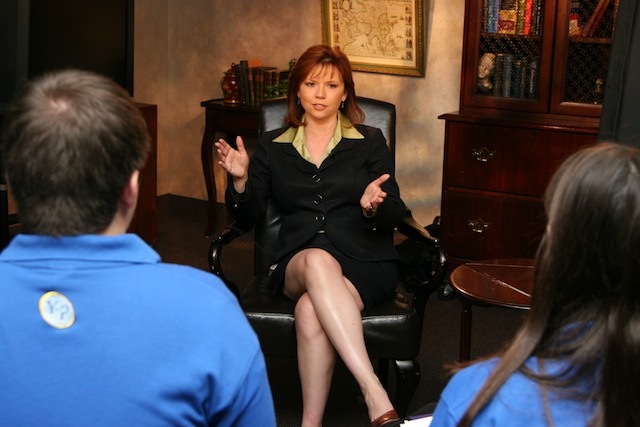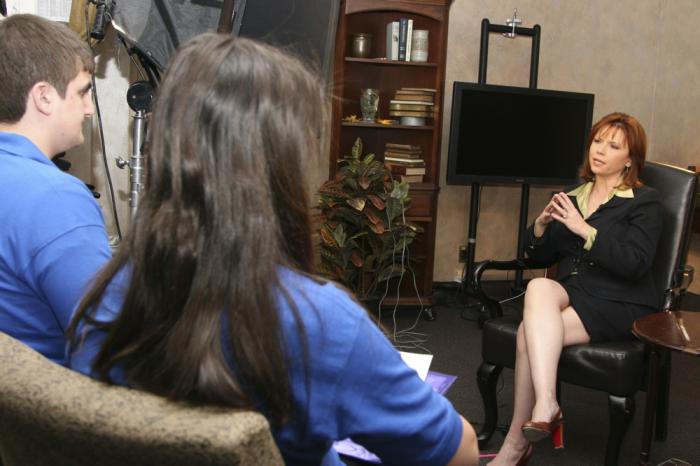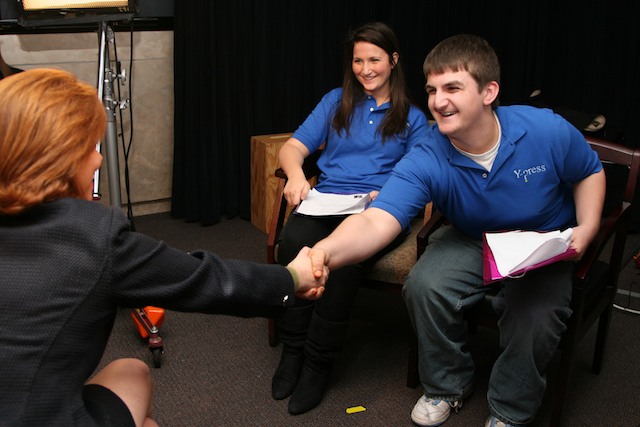Power of the Question
Lesson 5: Blogging & Transparency
WARM-UP ACTIVITY
Initially blogs were ubiquitous – on every and all topics — but as they evolved their focus narrowed. Ask each student if they use blogs and to find an example of a blog that they use as an information source. On a wipe-off board, list the sources students use, note duplicates and ask students to share reasons for use. Begin a rubric of student criteria.

CONCEPT FORMATION
In 2011, the Huffington Post sold to AOL for a record $315 million. Discuss how blogging has influenced society, and specifically news. Ask the class how blogging or tweeting has changed the way they get their information and if they think it has changed reporters’ work life? Make a list of students’ ideas and compare with criteria from the warm-up activity.
Small Box, an Indianapolis web agency, blogs about trends and issues. See Jack Shepler’s entry about the difference between blogging and news.
Many news sources, such as The Seattle Post-Intelligencer and The Christian Science Monitor are following the same suit as USA Today in that they are focusing more of their efforts on digital media rather than print media. At those newspapers’ sites, reporters have blogs and places designed for people to participate (such as from Facebook or Twitter). Because blogs are opinion-based, credibility has become an issue within the journalism community. Personal opinions mix with facts when journalists use social media sites such as Twitter may cause their opinions to be mistaken as truth by their readers. For example, Washington Post sports columnist Mike Wise posted a tweet that falsely stated that Pittsburg Steelers quarterback would be suspended for five games. Though Wise said he was providing false information to show how fast misinformation can spread online, he suffered the consequences by being suspended himself.
Resources
• The New York Times article about Mike Wise – “Washington Post Suspends Columnist for Twitter Hoax”
• The Washington Post article by ombudsman Andrew Alexander, “The toll of Mike Wise’s false tweet on Ben Roethlisberger”
In small groups or as a whole class, discuss these questions:
Have you found social media sites to be credible sources for information? Why or why not?
If you had to choose between reading a full-length article or a blog entry on a news topic, which would you choose and why?
When reading the blog entry, how do you know what you are reading is well-researched and accurate?
Should journalists be encouraged to use social media sites to communicate with readers and gather information? Why or why not?
What are the risks of using sites like Twitter? What are potential benefits?
APPLICATION
Show the class video five about the effect of blogging and tweeting on reporters’ questions. Prior to watching it, define the word transparent and ask students how it might relate to social media.
After viewing the video, review several of O’Donnell’s blog entries and then discuss her reference to sausage making. How has blogging made reporters’ questions accessible to the viewer? Discuss her comments about neutral language in questions and not using words with political connotations.
Use the internet to find examples of bloggers who have challenged her use of words News Busters: Exposing & Combating liberal media bias or Fair: Challenging Media Bias and Censorship since 1986
Ask students to write a short essay about the pros and cons of making questions more visible.
Have students check out several of the references below to learn about how the media views the effect of social media.
Social media posts affect reporters questions in NFC
What impact is SEO having on journalists? Reports from the field.
Reporters’ Roundtable: The state of blogging
Joan Shorenstein Center on the Press, Politics, and Public Policy
EXTENSION
In the Facing History curriculum for the documentary, “Reporter,” one of the questions that the author poses is: Why has the rise of the Internet made media literacy a “citizenship survival skill?” Do you agree that media literacy is a citizenship survival skill for young people today?” (page 33)
STANDARDS
These lessons meets content and skill standards across the middle and high school curriculum. In particular, this lesson addresses standards related to communication, research skills, critical thinking, and inquiry. Such standards can be found in a range of different disciplines, including Language Arts, Social Studies, Technology, Journalism, and Science. We encourage you to review state standards to determine what standards are applicable to your classroom. National Standards may also prove helpful and can be located at:
• National Council for Teachers of English
• National Council for the Social Studies
• National Educational Technology Standards
• Journalism Education Association
• National Science Education Standards




